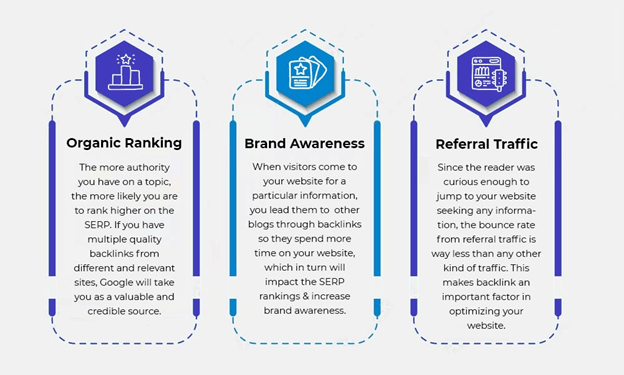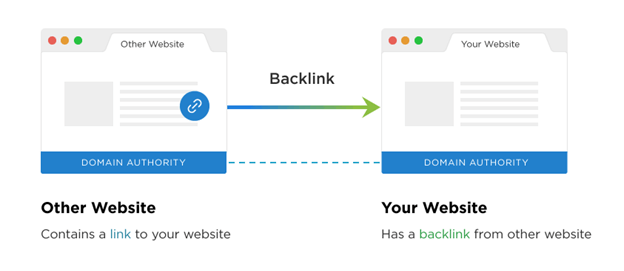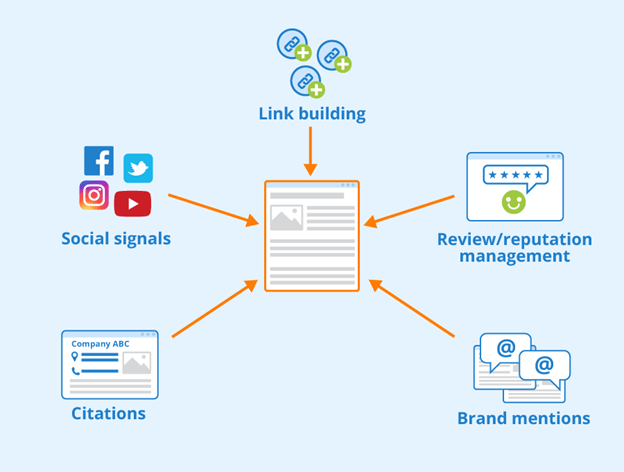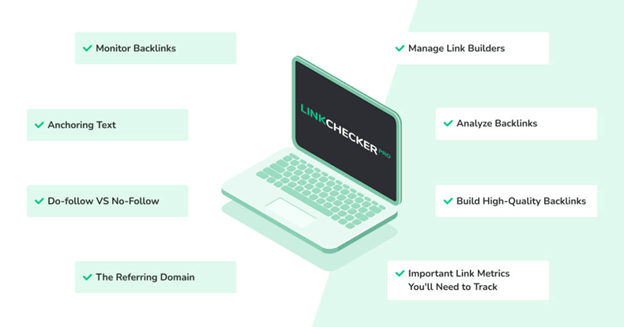SHARE

Building good backlinks is a crucial aspect of any successful SEO strategy. When done correctly, backlinking can significantly improve your website’s visibility and rankings on search engines.
In this step-by-step guide, we will explore the importance of backlinks, how to prepare your website for backlinking, various strategies for building quality backlinks, valuable tools to assist you in your journey, and how to monitor and maintain your backlinks effectively. Let’s dive in!
Understanding The Importance Of Backlinks
Before we delve into the nitty-gritty of backlink building, we must first understand what backlinks are and their role in SEO. Backlinks, or inbound links, are external links pointing to your website from other reputable sites. They serve as a vote of confidence for search engines, indicating that your content is valuable and trustworthy.
Quality backlinks are crucial in improving your website’s authority, visibility, and organic rankings on search engine results pages (SERPs).
If you’re looking to improve your backlink profile and search rankings, our SEO services can provide tailored strategies to boost your site’s authority and visibility.
But why are backlinks so important? Imagine you’re at a party, and someone introduces you to a well-known and respected individual.
You would naturally assume that this person’s recommendation holds weight and that they have a level of expertise in their field. Search engines work similarly. When your website receives backlinks from reputable sources, it tells search engines that your content is worth recommending to others. Now, let’s dive deeper into the world of backlinks and explore the difference between good and bad backlinks.
Defining Backlinks And Their Role In SEO
Backlinks, as mentioned earlier, are external links that direct users to your website. These links act as pathways, guiding users from one website to another. In the vast ocean of the internet, backlinks are like bridges connecting different islands of information. When search engines crawl the web, they follow these backlinks to discover new pages and determine how they relate to each other.
This process helps search engines understand the relevance and authority of your website, ultimately influencing your organic rankings. Imagine you’re writing a research paper and include references from reputable sources. Your professor would consider your essay more credible and reliable than one without references. Similarly, search engines view backlinks as endorsements from other
The Difference Between Good And Bad Backlinks
Not all backlinks are created equal. It’s important to distinguish between good and bad backlinks to ensure you pursue the right linking opportunities. Good backlinks are those that come from authoritative websites relevant to your niche. These links are acquired naturally through quality content and editorial decisions.
For example, suppose you run a fitness blog and a reputable fitness magazine links to one of your articles. In that case, it demonstrates that your content is valuable and relevant within the fitness community. On the other hand, bad backlinks are low-quality links obtained through manipulative tactics such as link farms or spammy websites. These links can harm your website’s reputation and rankings, so it’s crucial to avoid them.
Think of bad backlinks as the equivalent of a shady character vouching for your credibility at a party – it won’t end well. It’s worth noting that search engines have become more competent in recent years and can detect unnatural or spammy backlink practices.
So, it’s always best to focus on building a strong foundation of high-quality backlinks rather than resorting to questionable tactics that could lead to penalties. Understanding the difference between good and bad backlinks allows you to make informed decisions regarding your backlink-building strategy. Remember, quality over quantity is essential!
Preparing Your Website For Backlinking
Before embarking on your backlink-building journey, preparing your website for maximum impact is essential. Here are a few key steps to take:
Creating High-Quality, Link-Worthy Content
The foundation of any successful backlink strategy is creating top-notch, link-worthy content. Focus on producing high-quality articles, blog posts, guides, and other valuable content that other websites would be inclined to link to.
This could include original research, insightful industry analysis, or engaging storytelling that sets your content apart. Investing time and effort into creating exceptional content increases the likelihood of attracting backlinks and establishes yourself as an authoritative source in your industry.
When other websites recognise your value, they are more likely to link to your content, boosting your website’s visibility and credibility.Remember, content is king, and by prioritising quality over quantity, you increase your chances of attracting natural backlinks over time.
Optimising Your Website’s Structure And User Experience
Another essential aspect of preparing your website for backlinking is ensuring it is optimised for search engines and provides a seamless user experience. Pay attention to website speed, mobile-friendliness, intuitive navigation, and clear site architecture. Website speed plays a crucial role in user satisfaction and search engine rankings.
Slow-loading pages can frustrate visitors and lead them to abandon your site, resulting in missed opportunities for backlinks. Optimise your website’s performance by compressing images, minifying CSS and JavaScript files, and leveraging browser caching.
In today’s mobile-dominated world, having a mobile-friendly website is vital. With more people accessing the internet through their smartphones, having a responsive design that adapts to different screen sizes is essential.
A mobile-friendly website improves user experience and signals to search engines that your site is up-to-date and user-friendly. Intuitive navigation and clear site architecture make navigating your website more accessible for users and search engines. Implement a logical hierarchy of pages and use descriptive anchor text for internal links. This helps visitors find the information they need and enables search engines to crawl and index your site more effectively.
By optimising your website’s structure and user experience, you not only enhance your chances of attracting backlinks but also improve overall user satisfaction and engagement on your site. A well-structured and user-friendly website is more likely to be recommended and shared by others, leading to a natural increase in backlinks.
Strategies For Building Good Backlinks
Now that you’ve set the groundwork let’s explore some effective strategies for building quality backlinks:
Guest Blogging And Its Benefits
Guest blogging remains a powerful technique for acquiring quality backlinks. Identify industry-relevant websites that accept guest submissions and offer to write compelling, informative articles for their audience.
In return, you can include a link to your website within your author bio or the content itself, where appropriate. By providing valuable content to these websites, you build authority, increase visibility, and attract new audiences to your site. Guest blogging not only helps you build backlinks but it also allows establish yourself as an expert in your field.
When you contribute valuable content to other websites, you showcase your knowledge and expertise, gaining the trust and respect of the website’s audience and search engines. Furthermore, guest blogging provides an excellent opportunity to network with other industry professionals.
Collaborating with influential individuals in your niche can expand your reach and tap into your existing audience. This can lead to more backlinks, increased brand exposure, and potential business partnerships.
Utilising Social Media Platforms
Social media platforms offer a unique opportunity to connect with your target audience and promote your content. Regularly engage with your followers, share valuable articles, and participate in relevant discussions. By building a strong social media presence, you increase the likelihood of your content being shared and linked to by others, thereby improving your backlink profile. When using social media for backlink building, creating shareable content is essential.
This can include informative blog posts, engaging videos, or visually appealing infographics. You increase the chances of it being shared, liked, and linked to by others, crafting content that resonates with your audience ultimately boosting your backlink count. In addition to creating shareable content, actively engaging with your audience is crucial.
Respond to comments, answer questions, and participate in relevant conversations. Building a genuine connection with your followers encourages them to engage with your content and share it with their networks, leading to more backlinks and increased visibility.
Exploring The Power Of Influencer Outreach
Influencer outreach involves partnering with influential individuals in your industry to create collaborative content or promote your existing assets. By leveraging their authority and reach, you can gain exposure to a broader audience and increase the chances of acquiring quality backlinks.
Remember to build genuine relationships with influencers by offering value and maintaining mutually beneficial partnerships. When approaching influencer outreach, it’s essential to research and identify the influencers for your brand.
Look for individuals who have a strong presence in your industry and align with your values and target audience. You increase the likelihood of attracting backlinks from authoritative sources by partnering with relevant influencers to your niche. When collaborating with influencers, focus on creating valuable, engaging content that resonates with audience.
This can include co-creating blog posts, hosting webinars, or conducting interviews. By providing unique and insightful content, you attract backlinks and establish yourself as a trusted source of information within your industry.
Remember, building backlinks through influencer outreach is a long-term strategy that requires patience and persistence. Nurture your relationships with influencers, continue to provide value, and monitor the impact of your collaborations. Over time, these efforts can result in a strong backlink profile and increased visibility for your website.
Tools To Help You In Your Backlink Journey
Building and maintaining backlinks can be made easier with the help of various tools designed for SEO professionals. Here are a few that can assist you:
Overview Of Backlink Analysis Tools
Backlink analysis tools such as Moz‘s Link Explorer, Ahrefs, or SEMrush allow you to explore your backlink profile, identify which websites are linking to yours, and analyse the quality and relevance of those backlinks.
These tools provide valuable insights to help you prioritise your backlinking efforts and make data-driven decisions. When using Moz’s Link Explorer, you can see the number of backlinks pointing to your website and the domain authority of those linking sites. This information is crucial in determining the strength and credibility of your backlink profile.
Ahrefs, on the other hand, offers a comprehensive backlink analysis tool that allows you to track your competitors’ backlinks, identify new linking opportunities, and monitor the growth of your backlink profile over time.
With SEMrush, you can analyse your backlinks and conduct a competitive analysis to see how your backlink profile stacks up against others in your industry. By utilising these backlink analysis tools, you can better understand your backlink profile and make informed decisions on improving it.
Whether identifying toxic backlinks that may harm your website’s SEO or discovering new high-quality websites to reach out for potential backlinks, these tools are essential in your backlink journey.
The Role Of Seo Tools In Backlink Building
In addition to backlink analysis tools, other SEO tools like Google Analytics, Google Search Console, or Bing Webmaster Tools can help monitor your website’s performance, track organic traffic, and discover potential linking opportunities.
By harnessing the power of these tools, you can refine your backlink strategy and achieve better results. Google Analytics provides valuable insights into your website’s traffic sources, allowing you to identify which backlinks drive the most visitors.
With this information, you can focus on building relationships with websites with a proven track record of sending high-quality traffic.Additionally, Google Search Console and Bing Webmaster Tools offer features that allow you to monitor your website’s visibility in search engine results pages (SERPs) and identify any issues affecting your backlink profile.
By regularly monitoring these SEO tools, you can stay on top of your backlinking efforts and make necessary adjustments to improve your website’s visibility and organic traffic.
Whether optimising your website’s meta tags to attract more backlinks or identifying crawl errors that may be preventing search engines from indexing your site, these SEO tools play a crucial role in your backlink-building journey.
Monitoring And Maintaining Your Backlinks
Building backlinks is a task that takes time to complete. It’s essential to regularly monitor and maintain your backlinks to ensure they continue to impact your website’s rankings positively. Here are some critical steps to take:
Regularly Checking Your Backlink Profile
Periodically perform a backlink audit to analyse the quality and relevancy of your existing backlinks. This involves checking for broken or toxic links, identifying opportunities for link improvement, and assessing your overall backlink health. Use backlink analysis tools to simplify this process and stay on top of any changes.
Dealing With Lost Or Broken Backlinks
If you come across broken backlinks or discover that certain websites are no longer linking to you, take action to rectify the situation. Contact the website owners politely, requesting to update or replace the broken link. Additionally, consider contacting authoritative websites that mention your brand without linking and kindly ask if they could add a link to your website. In conclusion, building good backlinks is a fundamental component of a successful SEO strategy.
By understanding the importance of backlinks, preparing your website, implementing effective strategies, utilising helpful tools, and consistently monitoring and maintaining your backlinks, you can boost your website’s authority, visibility, and organic rankings. If you’re ready to strengthen your backlink strategy, our SEO services is here to help you achieve long-term results through ethical, high-impact link building. Schedule a consultation with us today.
Frequently Asked Questions About Backlinks
What’s The Difference Between a URL and a Backlink?
A URL (Uniform Resource Locator) is a web address that specifies the location of a resource on the internet and how to retrieve it. The complete string in the browser’s address bar (e.g., https://www.example.com). On the other hand, a backlink is a link from one website pointing to another. Suppose a website references and links to another site; that outgoing link is considered a backlink for the receiving site. The URL is used within the backlink to determine where the link points.
How do I Get SEO Backlink?
- Content Creation: Produce high-quality, valuable, and shareable content to which others want to link.
- Guest Blogging: Write articles for reputable websites in your niche and include a link to your site.
- Reach Out: Contact website owners and suggest they link to your valuable resources or content.
- Engage in Forums and communities: Participate in online discussions, providing valuable insights and occasionally linking to your content.
- Infographics: Create and share informative graphics that others might share and link back to.
- Use Social Media: Promote content on platforms like Twitter, LinkedIn, and Facebook, encouraging shares and potential backlinks.
What is Backlink in SEO?
In SEO, a backlink refers to an incoming hyperlink from one website to a webpage on another website. They are significant for SEO because search engines, especially Google, see backlinks as votes of confidence for a site. The more high-quality, relevant site backlinks, the more likely it will be considered authoritative, potentially leading to higher search rankings.
Do Backlinks Affect SEO?
How Many Backlinks Do I Need To Rank?
No fixed number of backlinks is needed to rank, as Google’s ranking algorithm considers multiple factors. The number and quality of backlinks required depend on the keyword’s competition, domain authority of competing sites, content quality, on-page SEO, and more. Rather than focusing on quantity, aim for high-quality, relevant backlinks from authoritative sources.
2 Stallions: Who We Are
2Stallions is an award-winning, full-service digital marketing agency headquartered in Singapore with regional presence across Southeast Asia. Since 2012, we’ve helped brands of all sizes turn strategy into growth through Search Engine Optimisation (SEO), Search Engine Marketing (SEM), social media marketing, content marketing, to website design and development.
Need funding support? We’ve got that covered too. 2Stallions is a pre-approved vendor for the PSG Digital Marketing Grant, allowing eligible Singaporean SMEs to claim up to 50% off our services. We are also vendors of the Enterprise Development Grant (EDG) and Digi-TAC Grant.
Our results-oriented approach has earned us various industry accolades, from the Marketing Excellence Awards, Asia eCommerce Awards to the Drum Awards for Digital Advertising APAC. We’re also certified partners with Google, TikTok, and Shopify, giving you direct access to the tools, insights, and support that drive real digital performance.
Let’s grow your business. Book a free strategy consultation and get your custom roadmap to digital success.


















